Perry Moore is the ultimate geek, and he readily admits it. Thirty-four years old, he still goes to the comic book store every Wednesday to check out the new releases. He grew up loving fantasy and sci-fi, and he’s never grown out of it.
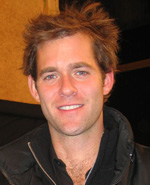
What kicked it all off was this little book called The Lion, The Witch and The Wardrobe, which his mom put in his hands when he was 7 years old. Moore never grew out of it, and in many ways, never grew up. He still approaches that book—his favorite of all-time—with childlike wonder.
So imagine his thoughts when, at the age of 29, he was appointed this daunting task: Convince the C. S. Lewis Company (i.e., the writer’s estate) to sign over the rights to the Chronicles of Narnia—including The Lion, The Witch and The Wardrobe—to turn the beloved classics into a series of movies.
Moore, then an executive with Walden Media, made his pitch, the Lewis folks were convinced, and the deal was done. Now, five years later, Moore’s lifelong dream comes true as The Lion, The Witch and The Wardrobe—made by Walden and distributed by Disney—releases to theaters worldwide this Friday. And when the credits roll, Perry Moore’s name will be near the top of the list—as Executive Producer.
 |
Moore, now 34, has chronicled the making of the film in a new book with a mouthful of a title: The Official Illustrated Movie Companion for The Chronicles of Narnia: The Lion, The Witch and The Wardrobe (HarperSanFrancisco). It’s an attractive coffee-table tome for any Narnia fan—of the book or the movie. But it’s more than just a bunch of pretty pictures; it’s also well written (Moore was an English lit major at the University of Virginia) and full of interesting behind-the-scenes info and insights—especially into the four kids who play the Pevensie children in the movie.
We chatted with Moore a few days ago about the movie companion book and, of course, the film itself. Moore’s enthusiasm was palpable. He sounded like a fanboy gushing about his favorite thing in the world—which, of course, is exactly what he was doing. “This movie,” he said, “exceeds even my wildest dreams.”
NOTE: Click each of the photos in this story to see a larger version.
Tell me a little about the movie companion book.
Perry Moore: It was special to write that, to sort of chronicle the Chronicle. The C. S. Lewis Company asked me to write it, so I took it very seriously. I’m a writer, but really, I was just a recorder, in a sense, and I had the best source material anyone could ever ask for, because this is an exceptional movie. I felt like we were all part of something really special, and part of a family. And my gratitude really goes to that family because the book is only as good as they are—the team that made the movie, and the movie itself. I was just in a nice position to let them shine, doing what they do best.
I’m just the ultimate fanboy living out a fan’s dream, because this was my favorite book as a kid.
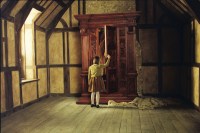 |
Click here to enlarge |
Why do you think Walden Media was the right company to make this movie?
Moore: They just had such vision. They had this radical idea that if you stuck to the book—instead of how Hollywood often diverges greatly from the source material—you’d end up with a good movie. I was really lucky to work at a company and to work with a director like Andrew Adamson who had the same brilliant vision for it. Andrew is literally a genius; I can’t believe how talented he is.
But why Adamson? Sure, he did a great job directing the Shrek movies, but this is so different.
Moore: He was not interested in doing anything short of a faithful adaptation. After we first met with him, he jotted down some thoughts on how he’d do the movie, and sent me like a 20-page fax over the weekend. He had mapped it out head to toe, exactly what he wanted to do. So having a document like that in front of you and then hearing him talk about exactly what he wants to do with the battle and the scenes and the creatures and everything, there was never a question of, “Is this not faithful to the book?” His vision for the movie was so confident.
I think he really got what C. S. Lewis intended, because he wanted to honor his vision of this book—a vision that was spawned by his imagination from reading it as a child. But how do you make that real? The answer is that Andrew spent years toiling away, creating the world of Narnia.
That can be risky, trying to inject too much of one’s own imagination when going from the book to the screen. Obviously a faithful adaptation will take some creative liberties, but…
Moore: Very few in this case. I would challenge anyone to find a movie that is a more faithful adaptation of the source material than this one.
One of our critics saw the film the other day. He said some characters have been changed. He said Edmund is more sympathetic in the film than in the book, and that his brattishness was a response to something Peter said early in the film. And the White Witch somehow knows that Edmund is a Son of Adam without asking him. And Aslan is somewhat diminished when he talks about the Deep Magic and “destiny,” and that Aslan even loses his temper at one point. He pointed out several things he thought significantly strayed from the book for these particular characters.
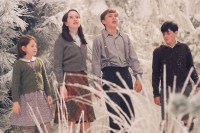 |
Click here to enlarge |
Moore: Well, I don’t know if I’d agree with those observations, but I would urge everyone to see it and think about it for themselves. But even if I did agree with those, I wouldn’t consider any of that a significant straying from the book. I don’t see the movie taking any crazy liberties. I love that people have this rabid affection for the book, and I think everyone is always going to have something nitpicky to say. That’s just the way it is. But I think overwhelmingly, people are going to love it. And like I said, I really don’t think you could name a book that’s been made into a more faithful adaptation as a movie.
I hear that Adamson was especially concerned about getting the White Witch just right.
Moore: Yes. One of Andrew’s concerns was that after years and years of villainesses on screen, a character like the White Witch can get a little diluted. Even though this is a story written a long time ago, Andrew wanted it to be daring and fresh and original; he would never want it to come off like a Cruella De Vil stereotype. That’s one things that was so brilliant about working with Tilda [Swinton, who plays the role]. She’d never veer anywhere close toward cliché; she’d run screaming in the other direction. So what she does with the character is phenomenal. It’s quite a feat of acting.
The Lord of the Rings and Harry Potter films have both set the bar very high for the sci-fi and fantasy genre. Has that affected the way you all have approached the making of this film, knowing that the bar has been set so high?
Moore: I would never settle for mediocrity, being the ultimate fanboy of this story. I wouldn’t settle for mediocrity whether Lord or the Rings or Harry Potter existed or not. It’s all about Narnia. I’ve always had this unwavering faith in this book and this story, and that existed long before I had ever read Lord of the Rings, long before J. K. Rowling even wrote Harry Potter. We at Walden approached the Lewis estate a year before those movies came out; our vision and our faith in this material existed above and beyond any other movie. I don’t have a whole lot to say about those movies, other than I love that people love magnificent fantasy. That’s a great thing.
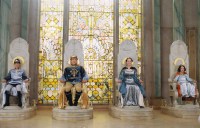 |
Click here to enlarge |
I’ve talked to Douglas Gresham, Micheal Flaherty, and others associated with the film. It seems like everyone is avoiding talking about this as a “Christian” story, but more as a story for everyone. Is that just carefully calculated marketing-speak?
Moore: Well, we decided to partner with Doug Gresham because he could speak for C. S. Lewis [Gresham is Lewis’s stepson and a co-producer of the film]. Doug told us very early on that Jack really did write this for everyone. That may be convenient for marketing the movie to everyone, but C. S. Lewis was very clear that this story was not for any one group—it was for everyone, and for the world.
To address the religion issue, there’s such a power to the story that if you want to see something deeper and more spiritual in there, you can, but I know plenty of people who don’t. But I always thought movies that had some of those deeper truths and meanings were better movies. Films like Star Wars or The Matrix are fantastic not only because they have a real deep soul to them, but because they deal with these wonderful messiah stories.
You first read The Lion, The Witch and The Wardrobe at the age of 7, but I understand you were also into comic books, fantasy and sci-fi. Where did Narnia fit into all of that?
Moore: That’s what started it all. Narnia kicked off my lifelong relationship with storytelling, with wanting to read everything I could get my hands on—certainly fantasy, though I like to call it “literature of the ideas.”
And even now as a grown-up, you’re still that way.
Moore: Can you believe I made a career out of it? Who knew? People used to tell my mom, “Why do let him read all that stuff? Why does he always have his nose in a book?” It turned out to be a good thing.
You’re still a comic book geek?
Moore: Oh yeah. Every Wednesday I go to the comics store to see what’s new. And one of the highlights of this movie for me is Disney flew me out to host the big Narnia presentation at Comic Con in San Diego in July. That was such a treat. I felt like I had come home to my people. The mother ship had landed.
What were your duties in the making of the movie?
Moore: You wear a lot of hats as a producer. As an executive producer it’s everything from helping with the rights, putting together the team, hiring the director, looking at story notes, watching 4,000 children on tape for casting. There’s a lot to do. And a lot of times you’re putting out fires and you’re making things smooth and easy—certainly for the kids [who played the Pevensie children]. We made a real pledge to their families, to look after those kids. They’re a special groups of kids.
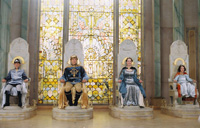 |
Click here to enlarge |
I interviewed Anna Popplewell [who plays Susan], and she sure seemed special.
Moore: She’s fantastic. What a gifted child. Sometimes I talk to her and I feel like she’s a peer. She’s more mature than I am in a lot of ways! She’s just a bright light, so generous and thoughtful. She was amazing to have on that movie, because the other kids sometimes looked to her for guidance and support.
Considering that your budget was about $150 million, how much does this movie need to make to be considered a success?
Moore: I don’t know. You need to ask some of the number crunchers at Disney or Walden. I’m not involved on that level of accounting.
OK, avoiding the specific numbers, does it merely have to break even for us to see a sequel—whether it’s Prince Caspian or something else?
Moore: I don’t know. Again, that’s a Disney/Walden question. But if the movie connects with audiences on the level that we believe it will, and being the rabid Narnia fan I am, I’d be really happy for all seven of the books to be made. C. S. Lewis wrote that Narnia is a place you keep wanting to come back to. And I think when you honor the power of that story, then the movie has the same effect, and you keep wanting to come back. I’ve certainly returned to Narnia many times.
How many times do you think you’ve read the book?
Moore: Before we started making the movie, probably three or four times. But from the time we went after the rights at Walden to now, I don’t even think I could count. Hundreds. Too many to count. But it was always a pleasure to come back to it.
Any last words?
Moore: It takes a miracle to make a movie, and an even bigger miracle to make a great movie. But I’ve always had faith in this story. Narnia has always been there for me, and I just know I’ll always be wanting to go back.
To order Perry Moore’s movie companion book, click here. For more of our Narnia coverage, check out our special section.
The four images from the film also appear in The Chronicles of Narnia: The Official Movie Companion, by Perry Moore (HarperSanFrancisco, Publisher). Images Copyright 2005 Disney Enterprises, Inc. and Walden Media, LLC.All rights reserved.









